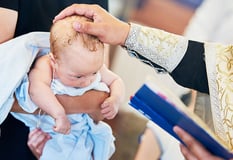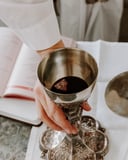What are Sacraments?
As Catholics, we believe that the sacraments are, as St. Augustine put it, outward and visible signs of inward and invisible grace. Outwardly, the sacraments involve words and physical matter and actions, while inwardly they are the direct means by which we experience God’s grace in our lives. The sacraments are far more than mere rituals, or symbols of events that happened long ago; rather, they are a vital source of the help that God freely offers to aid us in our journey of faith.
Each of the seven sacraments was instituted by Jesus Christ, and they are the primary way for us to engage in our faith and grow in our relationship with God. The Father gave his Son out of absolute and perfect love for us, and in the sacraments we encounter the Son’s self-giving love. As we participate in the Church’s liturgies and receive the sacraments, the Holy Spirit works in us to make us more like Jesus.
The sacraments are at the heart of our Catholic faith, and we want to encourage you to receive the sacraments as often as you are able. If you have any questions or would like to receive any of the sacraments, please contact the parish office and we would be happy to assist you.
Rite of Christian Initiation of Adults (RCIA)- is the process of initiation (Baptism, Confirmation, Eucharist) into the Body of Christ and the Roman Catholic Church for all those who are not baptized. If interested, please contact the Parish Center. Baptized non-Catholics and Adult Catholics, who have not been Confirmed, are encouraged to contact the parish offices for information on this process.
Sacraments of Initiation:
Sacraments of Healing:
Sacraments of Communion and Mission:

The Seven Sacraments of the Catholic Church
The seven sacraments of the Catholic church are baptism, confirmation, Eucharist, penance, anointing of the sick, marriage and holy orders.
The Beauty of a Sacramental Marriage
Early in my marriage my husband sat across from me and shared something he’d been keeping in for six months: The clothes on our bedroom floor really bothered him. I was shocked. The floor of our...